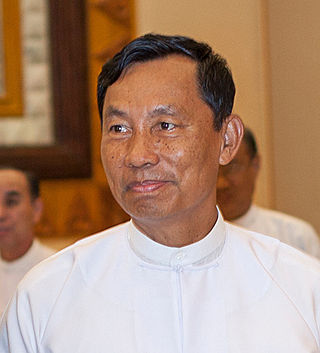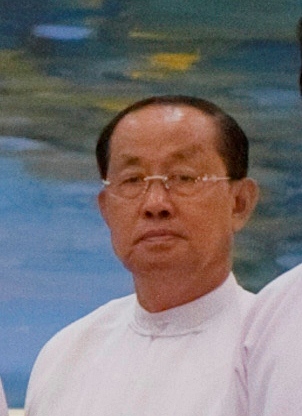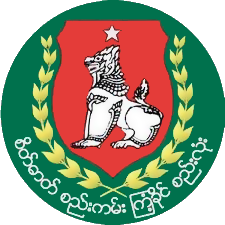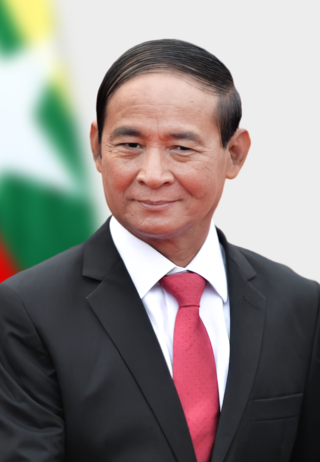
Thura Shwe Mann is a Burmese politician who was Speaker of the Pyithu Hluttaw, the lower house of parliament from 31 January 2011 to 29 January 2016. He is a former army general and, whilst being a protégé of senior general Than Shwe, was considered the third most powerful man in the State Peace and Development Council (SPDC), which ruled Myanmar until 2011.

The president of the Republic of the Union of Myanmar is the head of state and constitutional head of government of Myanmar. The president chairs the National Defence and Security Council and normally leads the Cabinet of Myanmar, the executive branch of the Burmese government, though the military prime minister leads the cabinet under the current state of emergency. Acting President Min Aung Hlaing, the head of the military and prime minister since 2021, is the current holder since Acting President Myint Swe transferred his powers in July 2024. Myint Swe had himself been installed by Min Aung Hlaing through a military coup d'état on 1 February 2021. There is no constitutional mechanism for the transfer of presidential authority outside the order of succession, making the constitutionality of the transfer questionable according to legal experts. Though a constitutionally powerful position, the presidency is a largely symbolic post under the current military government, with the only presidential action having been to declare and extend the state of emergency.

Thein Sein is a Burmese politician and retired military general who served as the 9th President of Myanmar from 2011 to 2016. He previously served as prime minister from 2007 to 2010, and was considered by many in and outside Myanmar as a reformist leader in the post-junta government.

ThihathuraTin Aung Myint Oo is a Burmese former military official and politician who served as First Vice President of Myanmar from 30 March 2011 to 1 July 2012. He is also chairman of Burmese Trade Council, having been appointed in November 2007 by Than Shwe, in response to Saffron Revolution demonstrations in October of that year, and Minister of Military Affairs. He joined the Buddhist monkhood on 3 May, after speculation over his disappearance had circulated throughout news media.
Myint Swe is a Burmese politician and retired army officer who is currently Vice President of Myanmar since 30 March 2016 and previously served as Acting President of Myanmar from 1 February 2021 to 22 July 2024 making him the longest serving Acting President in Myanmar history. He also served as the acting president after the resignation of President Htin Kyaw from 21 March 2018 to 30 March 2018, and the chief minister of Yangon Region from 30 March 2011 to 30 March 2016. A member of the military proxy Union Solidarity and Development Party, he is an ethnic Mon former lieutenant general in the Myanmar Army.

The National Democratic Force (NDF) is a political party in Myanmar (Burma). It was founded by former members of the National League for Democracy (NLD) who disagreed with the party leadership's decision to boycott the 2010 general election.

The Union Solidarity and Development Party is an ultranationalist, pro-military political party in Myanmar. Alongside the National League for Democracy, it is one of Myanmar's two principal national parties. USDP is the successor to the former ruling military junta's mass organisation, the Union Solidarity and Development Association, and serves as the electoral proxy of the Tatmadaw (military), which operates as a state within a state. Many of its political candidates and leadership are retired generals. It supports authoritarian military leadership. USDP was founded by Prime Minister Thein Sein to contest the 2010 Myanmar general election; the party was headed by Sein until 2013. Since 2022, it has been led by Khin Yi, who was installed as a loyalist of military leader Min Aung Hlaing.

The Pyidaungsu Hluttaw is the de jure national-level bicameral legislature of Myanmar established by the 2008 National Constitution. The Pyidaungsu Hluttaw is made up of two houses, the 224-seat Amyotha Hluttaw, or "House of Nationalities", and the 440-seat Pyithu Hluttaw, or House of People's Representatives. There is no mention in the 2008 Constitution of any ‘lower’ or ‘upper’ houses: both the Pyithu Hluttaw and the Amyotha Hluttaw enjoy equal power to initiate, review, amend, and pass legislation.

Dr Sai Mauk Kham is a Burmese politician and physician who currently serves as a House of Representatives MP for Lashio Township constituency. He previously served as First Vice President of Myanmar from 1 July 2012 to 30 March 2016. He was elected as Second Vice President of Myanmar on 4 February 2011, defeating Aye Maung of the Rakhine Nationalities Development Party and receiving 84% of the votes in the Amyotha Hluttaw.

The Cabinet of Myanmar, officially the Union Government, is the executive body of the government of Myanmar led by the prime minister of Myanmar. The Provisional Government serves as the current cabinet.
The Union Election Commission is the national level electoral commission of Myanmar (Burma), responsible for organising and overseeing elections in Burma, as well as vetting parliamentary candidates and political parties.

Thray SithuNyan Tun is a Burmese politician who currently serves as a member of parliament in the House of Representatives for Zigon Township constituency. He previously served as Second Vice President of Myanmar from 15 August 2012 to 30 March 2016. He is a commander-in-chief of the Myanmar Navy with the rank of admiral, retired in 2012. He was elected as Second Vice President of Myanmar on 15 August 2012 following the resignation of Tin Aung Myint Oo.

Win Myint is a Burmese politician who served as the tenth president of Myanmar from 2018 to 2021 where he was removed from office in the 2021 coup d'état. He was the speaker of the House of Representatives from 2016 to 2018. He also served as a member of parliament in the House of Representatives from 2012 to 2018. Win Myint was viewed as an important ally of State Counsellor Aung San Suu Kyi. As Suu Kyi was the de facto leader of the country, Win Myint was seen as a puppet of her.

General elections were held in Myanmar on 8 November 2015, with the National League for Democracy winning a supermajority of seats in the combined national parliament. Voting occurred in all constituencies, excluding seats appointed by the military, to select Members of Assembly to seats in both the upper house and the lower house of the Assembly of the Union, and State and Region Hluttaws. Ethnic Affairs Ministers were also elected by their designated electorates on the same day, although only select ethnic minorities in particular states and regions were entitled to vote for them.

The National Defence and Security Council is an eleven-member national security council responsible for security and defence affairs in Myanmar. Though the president is the chief executive of the government of Myanmar, the 2008 Constitution reserves certain important executive powers for the NDSC and certain actions of the president and the Tatmadaw (military) require approval by the NDSC. Of the 11 members, the commander-in-chief of defence services appoints 5 members and controls 6 votes. The NDSC's existence is enshrined in Chapter V of the Constitution of Myanmar, and it was formed on 31 March 2011.

The Presidential Electoral College is an electoral college made up of MPs that elects the President of Myanmar.

The cabinet of Thein Sein, headed by President Thein Sein, is the first democratically elected government of Myanmar after the military government. It took office on 30 March 2011 after the 2010 Myanmar general election to 30 March 2016.

Myanmar's military government plans to hold a general election for elected seats in the Amyotha Hluttaw and the Pyithu Hluttaw of the Assembly of the Union, currently dissolved, at an unspecified time in the future. The planned election would be the first after the 2021 military coup d'état. Though military ruler Min Aung Hlaing initially promised to hold the election by August 2023, the military has since indefinitely delayed the election in the face of increasing violence.

An indirect presidential by-election was held in Myanmar on 28 March 2018, after the resignation of Htin Kyaw. Members of the Assembly of the Union voted for his replacement.

Indirect presidential elections were held in Myanmar on 15 March 2016, after the 2015 general election. Members of the Assembly of the Union voted for the country's President, and two Vice-Presidents.














